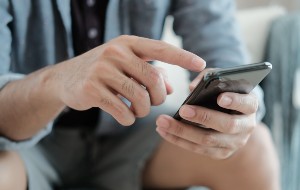Table of contents
- Is WhatsApp safe from government?
- Can government tap WhatsApp calls?
- Can government access WhatsApp messages?
- How to protect yourself from government spying on WhatsApp
- 1. Use Clario’s Anti-spy setup
- 2. Turn on WhatsApp security notifications
- 3. Remove permissions you don’t need
- 4. Lock your WhatsApp
- Conclusion
Is WhatsApp safe from government?
Kind of… The E2EE encryption keeps WhatsApp safe from government surveillance when it comes to your messages and calls. They can only be seen or heard by you and the person you’re communicating with. Even WhatsApp can’t access them.
But that doesn’t mean governments can’t make data requests. They can ask for specific information, though they won’t get your messages or call content.
What does end-to-end encryption really do?
E2EE is what makes WhatsApp one of the most secure messaging app options. It scrambles your messages, videos, and voice calls into gibberish during transmission and can only be decrypted by the intended recipient’s device.
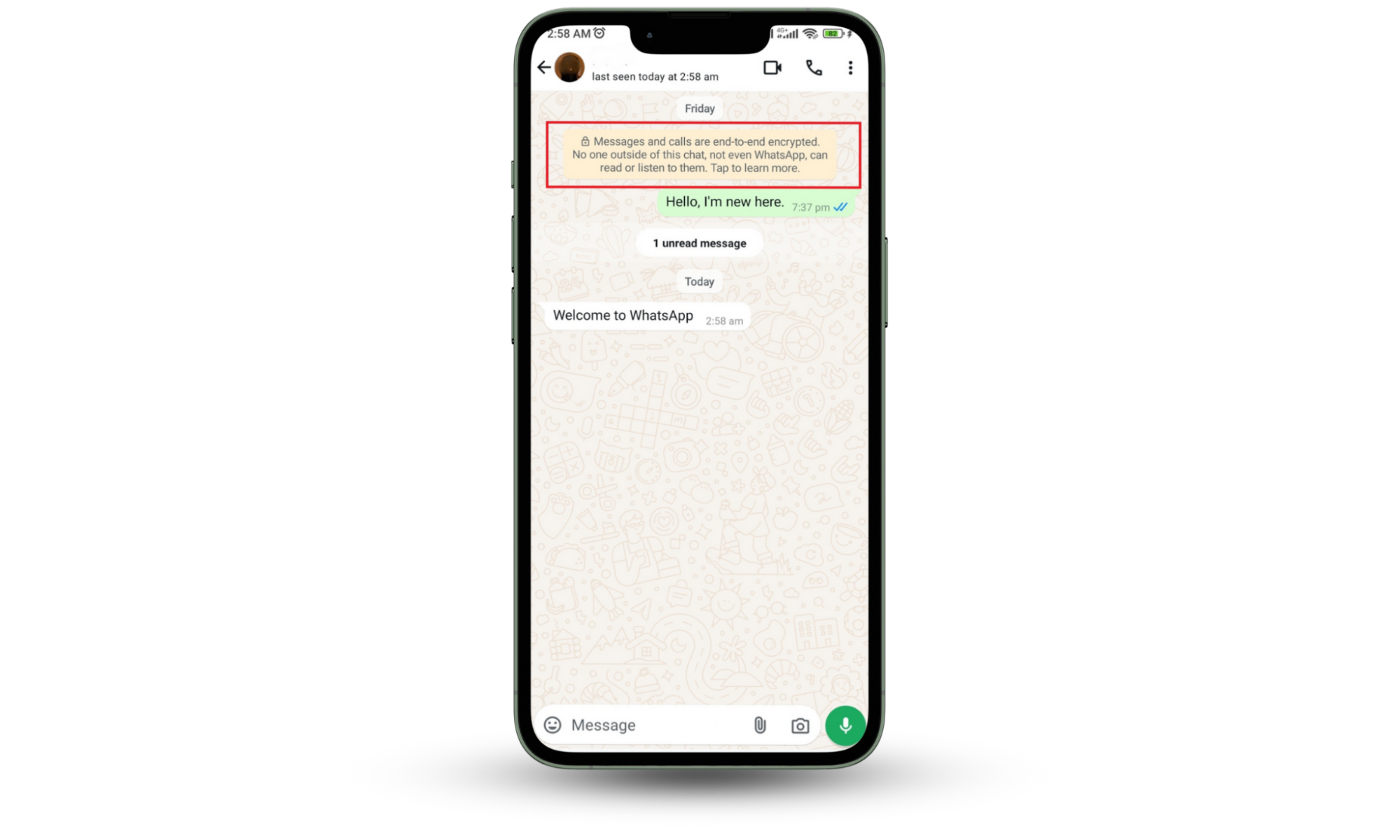
What happens when governments request data?
Governments can legally request information from WhatsApp, but these requests are not granted entirely. Whatsapp does not include the content of your messages, but they do share other info.
Here’s what a government request involves:
- Applicable laws:
- In the U.S., government agencies need a valid subpoena, court order, or search warrant under laws like the Stored Communications Act (SCA).
- Internationally, requests must comply with international standards, Whatsapp’s terms of service, local laws, and mutual legal assistance treaties (MLATs) when involving cross-border investigations.
- What they can access: Governments can request basic details like your name, when you started using the service, your last seen date, IP address, device type, email, profile photo, and "about" info.
- What stays private: Your messages, attachments, and calls remain encrypted and aren’t shared.
Can government tap WhatsApp calls?
Much like your messages, governments can’t directly listen to WhatsApp calls because end-to-end encryption prevents this. However, governments can monitor metadata, which is information about your communication but not the actual content.
For example, they might be able to see who you’re calling, when, and for how long.
How does this happen? Governments use a technique called traffic analysis. This doesn’t break WhatsApp’s encryption; instead, it studies patterns in internet traffic. By observing these data flows, they can infer:
- Who you’re talking to
- The timing of the communication
- The general location of users based on their IP addresses
It’s like watching cars on a highway. They can’t see what’s inside the cars, but they know where they came from, where they’re going, and how long they were on the road.
Can government access WhatsApp messages?
Governments can’t access your WhatsApp messages due to E2EE. Once messages are delivered, they are deleted from WhatsApp’s servers. But, as we said earlier, governments can make formal requests to WhatsApp for specific types of data under strict legal guidelines.
This doesn’t include the content of your chats, but it might include account information.
Your government can request:
- Basic subscriber information: Your name, phone number, profile photo, and account creation details.
- Metadata: Information like who you contacted, the time of communication, and the type of communication (e.g., text or call).
- Logs in rare cases: If required by a Trace Order or Pen Register Trap, WhatsApp may share records showing who you’ve contacted and when.
However, if you were to ask whether WhatsApp messages can be traced, the answer would be in the affirmative.
Governments can use techniques like traffic analysis to monitor patterns. They can’t see the content of your messages, but they can trace where messages are being sent, when they’re sent, and who is communicating.
Curious fact
While WhatsApp says delivered messages are deleted from its servers, it admits that undelivered messages and forwarded media are temporarily stored under its ‘Information We Collect’ policy.WhatsApp doesn’t explicitly state that this data is shared. However, its Information We Share policy allows disclosure of “information we collect” when required by law. This suggests undelivered messages or media might be included under certain legal conditions.
For WhatsApp to process a government request, it must include:
- A valid legal basis, such as a subpoena or court order
- Specific information identifying the account, like the phone number
- Contact details for the requesting authority, including an email from a government domain
Do you get notified if your data is requested?
WhatsApp says it may inform users about government requests for their data unless prohibited by law or in exceptional cases like emergencies or child exploitation investigations.
How to protect yourself from government spying on WhatsApp
You might not need to panic about government access to your WhatsApp chats. First, the app’s encryption keeps your messages safe, and WhatsApp has strict policies about sharing data. Second, why would the government target you in particular? I assure you, the government is not spying on you unless you are part of a terrorist organization or intend to be in one.
WhatsApp can also reject requests if they don’t align with international standards or legal requirements.
However, there’s a risk of mass surveillance, such as traffic analysis. Even if you get into one of the databases the government is scanning, they only analyze by keywords—they do not get the full contents of your messages and calls.
The concern that remains is whether someone else can spy on your WhatsApp conversations. Yes, they still can—anyone with access to your device or your contacts’ devices can spy on your conversations. Here’s how to protect yourself against nosy spies.
1. Use Clario’s Anti-spy setup
Clario’s Anti-spy setup gives you step-by-step guidance to secure your social media accounts, including WhatsApp, and helps block unauthorized access. It’s designed to protect against spying attempts by covering areas you might overlook.
How to use Clario’s Anti-spy setup on your phone:
- Download Clario Anti Spy, and sign up for a subscription to create an account.
- On the dashboard, click Set Up under Anti-spy Setup.
- Select what you want to protect from the menu. In this case, it would be Protect Social Media Accounts.
- Now, follow the guide to protect your social media accounts from prying eyes.
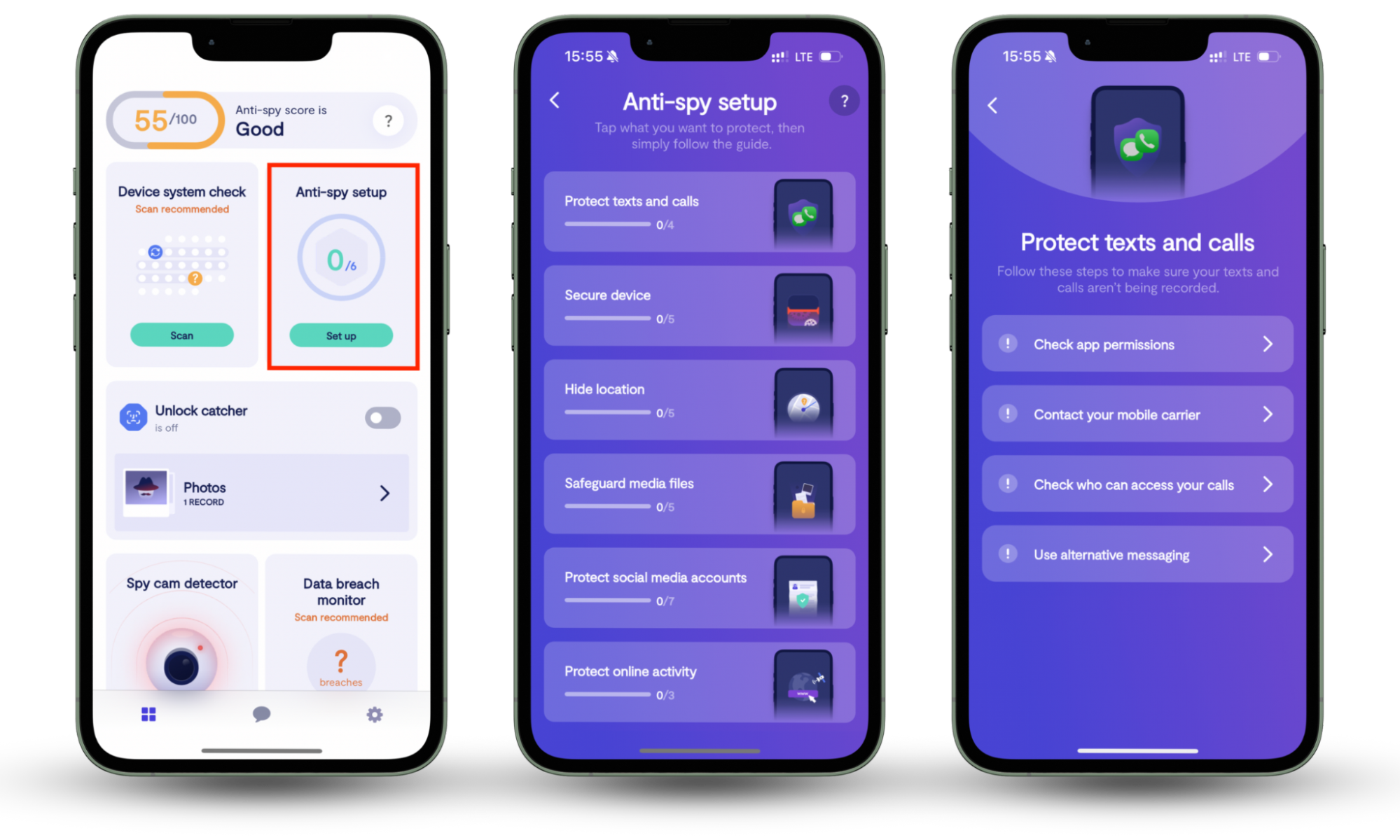
2. Turn on WhatsApp security notifications
WhatsApp's Security Notifications alert you when a contact's security code changes, indicating they may have reinstalled WhatsApp, switched devices, or changed their phone number. It does not mean that someone intercepts your messages, but it reminds you to check if this person is the original contact.
Here’s how to enable security notifications on your smartphone:
- Open WhatsApp.
- Tap the Settings icon (a cog icon at the bottom right corner for iPhones).
- Select Account.
- Tap Security Notifications.
- Toggle it on.
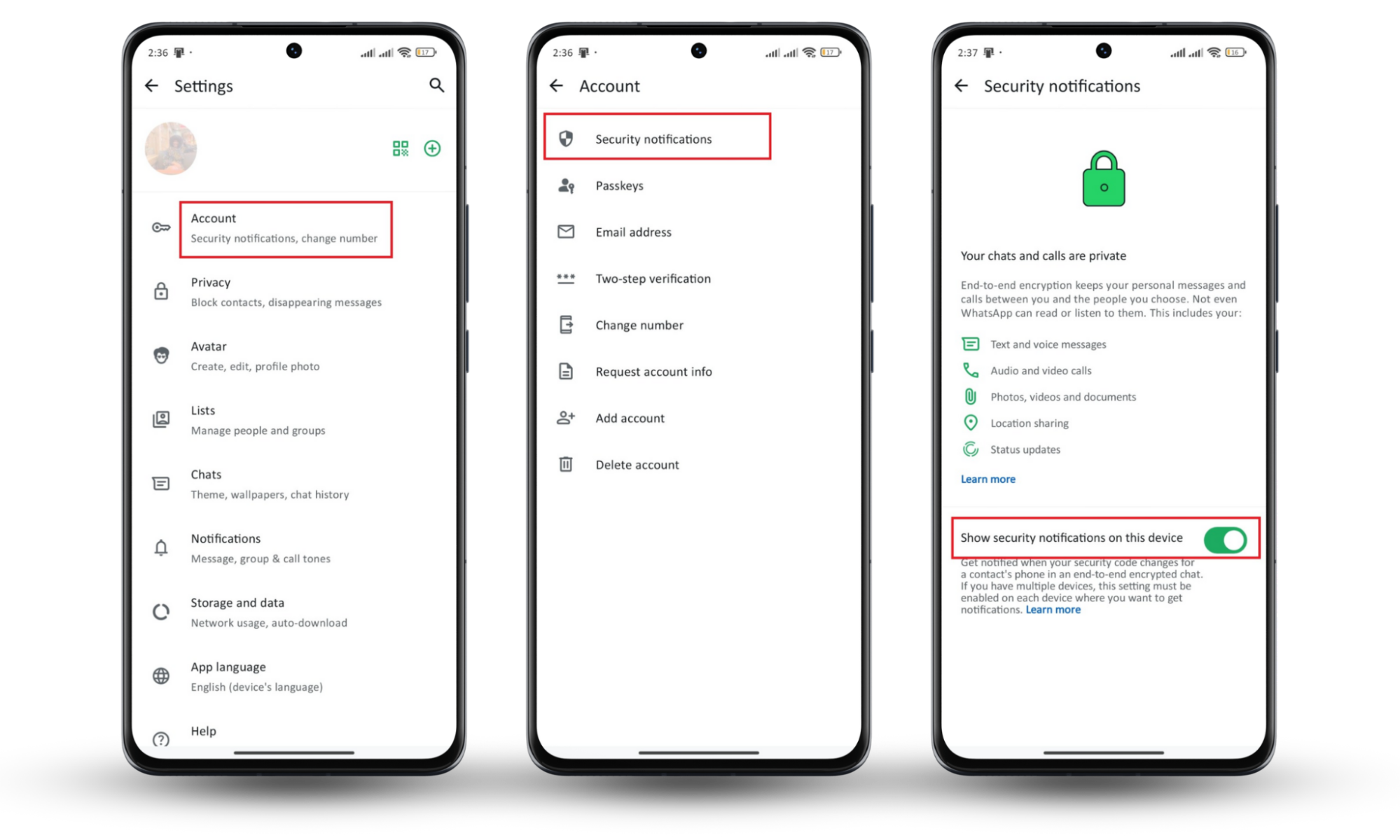
3. Remove permissions you don’t need
WhatsApp doesn’t require access to everything on your phone, and cutting back on permissions can help protect your privacy.
For instance, if you turn off WhatsApp’s access to your location and contacts, it limits the data the app can share with third parties.
Follow these steps to remove location and contact permissions for WhatsApp:
- Open your phone’s Settings.
- Find and tap Apps (then Manage apps in Android).
- Select WhatsApp (or input it in the search box).
- Tap App permissions (in Android).
- Turn off Location and Contacts.
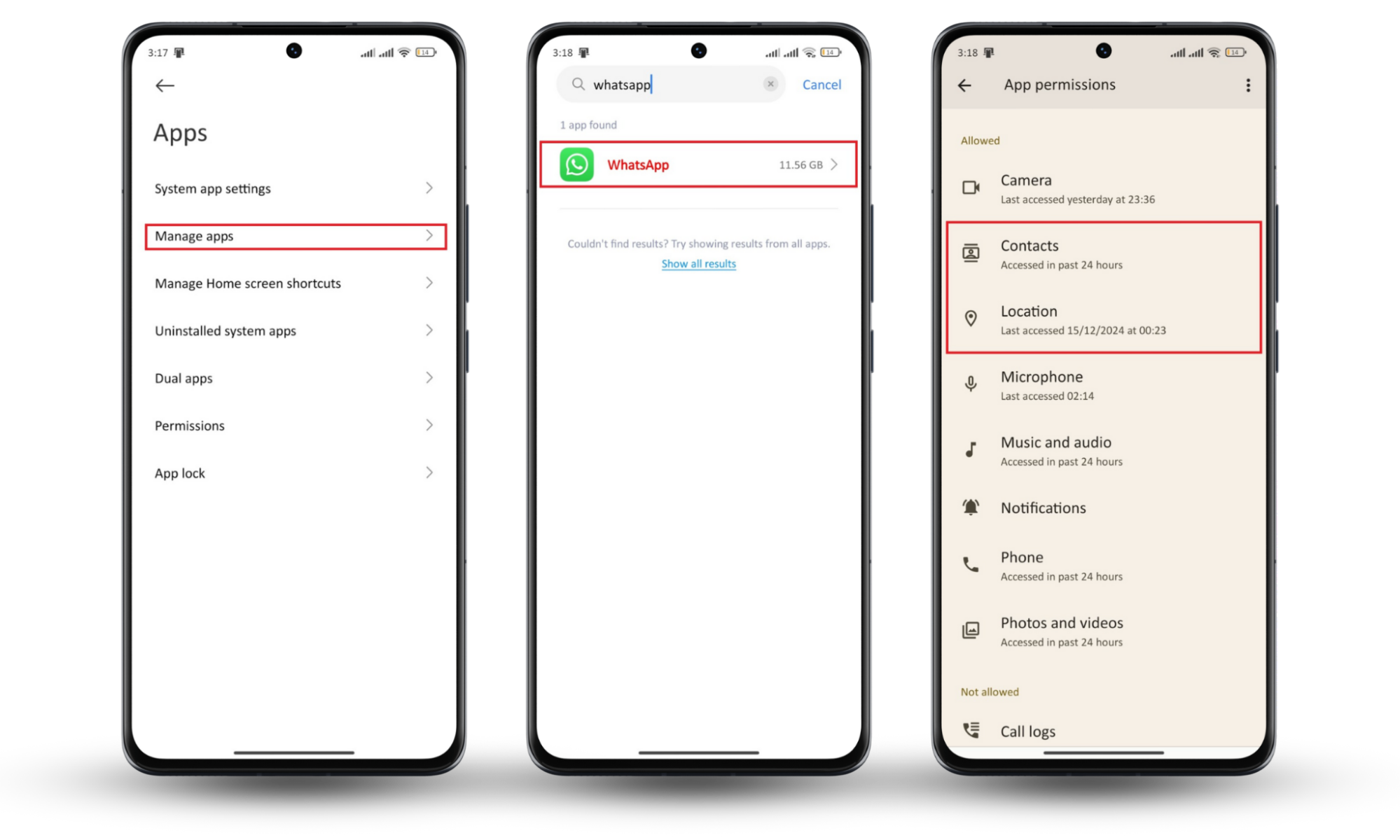
Note
You won’t be able to share your location with contacts after turning off location permissions.
4. Lock your WhatsApp
If someone has physical access to your phone, they could spy on your chats. Locking WhatsApp adds an extra layer of protection, such as fingerprints or facial IDs.
Here’s how to enable App Lock on WhatsApp:
- Open WhatsApp.
- Go to Settings and tap Privacy.
- Scroll to App Lock and enable it.
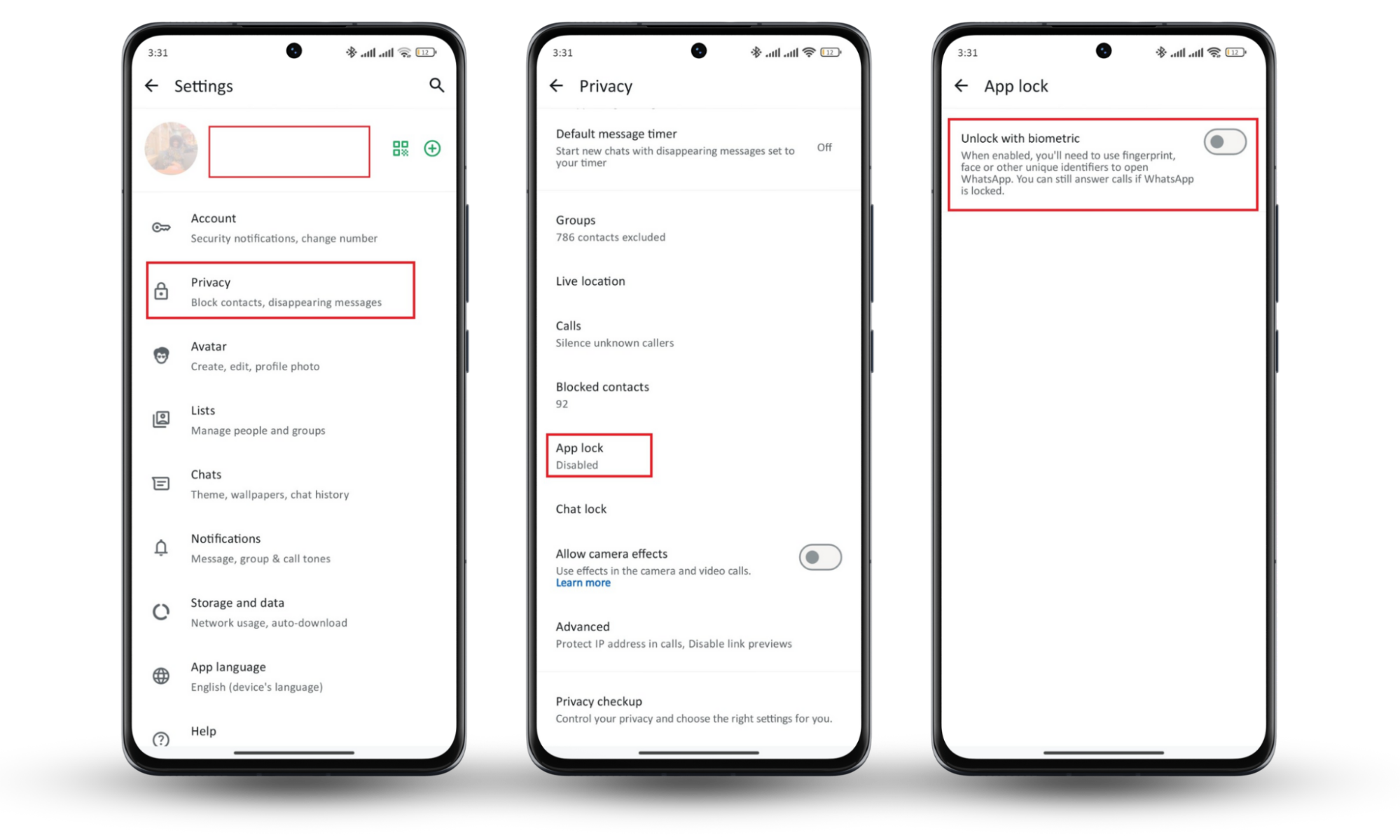
If you’re still concerned about unauthorized access to your account, see this guide on how to stop someone from accessing my WhatsApp for more actionable security advice.
Conclusion
It’s good to know that WhatsApp’s encryption keeps your messages safe from prying eyes, but staying secure goes beyond what the app offers.
Risks like traffic analysis or someone snooping on your device are still possible. The good news is you can take simple steps to protect yourself, like turning on security notifications, limiting app permissions, locking your WhatsApp, and using Clario’s Anti Spy setup.
Download Clario Anti Spy now and give yourself that extra layer of protection.


